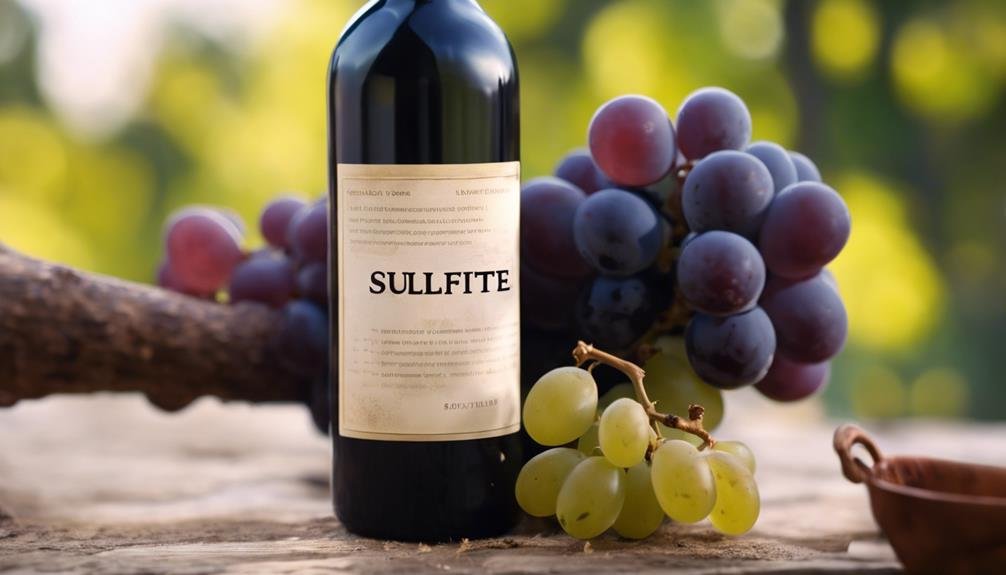Sulfites in wine are fundamental additives used for preservation and flavor enhancement. Regulations mandate labeling for sulfite levels above 10 parts per million. Sulfite sensitivity can impact asthma sufferers, triggering respiratory symptoms. Levels in wine typically range from 5 to 200 mg/L, with red wines containing around 50 mg/L. Sulfites play an important role in inhibiting microbial growth and oxidation, preserving wine quality over time. They affect the wine's characteristics, including aroma, flavor, and aging potential. For sensitive individuals, sulfite-free wine options exist, catering to various preferences and needs in the industry. Understanding sulfites in wine is essential for making informed choices.
Regulations on Sulfite Labeling
In the United States and Australia, regulations mandate the labeling of sulfite content on wine bottles, with labeling being required for sulfite levels exceeding 10 parts per million.
Sulfite sensitivity can pose health implications for individuals, especially those with asthma, as sulfites are known to trigger respiratory symptoms in susceptible individuals.
While sulfites are not the primary cause of red wine headaches, their presence in wine has raised concerns due to potential health problems associated with their consumption.
Understanding the regulations surrounding sulfite labeling is essential for consumers to make informed choices, particularly if they have sensitivities to sulfites.
Understanding Sulfite Levels in Wine
Regulations governing sulfite labeling on wine bottles highlight the importance of understanding the varying sulfite levels present in different types of wines. Sulfite levels in wine can range from 5 to 200 mg/L, with the legal limit in the U.S. set at 350 mg/L. Dry red wines typically contain around 50 mg/L of sulfites, with low acidity wines requiring more sulfites for preservation. Surprisingly, red wines generally need fewer sulfites compared to white wines. Sulfite testing is essential for individuals with wine allergies to make sure they can enjoy wine without adverse reactions. Below is a table illustrating the sulfite levels in different types of wines:
| Wine Type | Sulfite Level (mg/L) |
|---|---|
| Red Wine | 50 |
| White Wine | 70 |
| Rose Wine | 60 |
| Sparkling Wine | 80 |
| Dessert Wine | 100 |
The Role of Sulfites in Wine Preservation

Sulfites play an important role in preserving the quality and longevity of wines by inhibiting microbial growth and oxidation processes. Sulfite oxidation, a chemical reaction that occurs when sulfites react with oxygen, helps prevent wine from spoiling quickly. By slowing down these oxidation processes, sulfites aid in maintaining the flavor and aroma of wine during aging.
Additionally, sulfites act as a barrier against harmful bacteria and yeast that could otherwise spoil the wine. This preservation function is essential for ensuring that wines can be stored for extended periods, allowing them to develop complex flavors and mature gracefully over time. Essentially, sulfites are indispensable for safeguarding the integrity of wine during the aging process.
Impact of Sulfites on Wine Characteristics
The presence of sulfites in wine not only plays an essential role in preservation but also substantially influences the overall characteristics of the wine, impacting its flavor, aroma, and aging potential.
| Effect on Aroma | Taste Perception |
|---|---|
| Sulfur compounds can | Sulfites can impact |
| affect the wine's aroma, | the perception of taste, |
| releasing more sulfur | influencing how fruity, |
| compounds in warmer wines | acidic, or tannic the |
| and less in chilled ones. | wine may taste. |
Addressing Sulfite Concerns and Alternatives

In response to growing consumer concerns and health considerations, the wine industry continues to explore and offer alternatives to address sulfite sensitivity. For individuals seeking sulfite-free options, there are wines available that eliminate sulfites from the winemaking process. These sulfite-free alternatives cater to those with sensitivities and provide a solution to enjoy wine without the worry of sulfite reactions.
Additionally, natural alternatives are gaining popularity as a way to enjoy wine without added sulfites. Natural wines, made without the use of synthetic chemicals or sulfites, offer a different approach for those looking to avoid sulfur compounds in their wine. By providing sulfite-free and natural alternatives, the wine industry aims to accommodate a broader range of consumers with varying sensitivities and preferences.
Frequently Asked Questions
How Do Sulfites Affect the Aging Potential of Wines?
Sulfite concentration in wine plays a vital role in determining its aging potential. Properly managed sulfites can preserve wine quality by inhibiting oxidation and microbial activity, leading to improved aging characteristics and the maintenance of desirable flavors and aromas.
Can Sulfites in Wine Cause Allergic Reactions in Some People?
Sulfites in wine can cause allergic reactions in some individuals with sulfite sensitivity. Symptoms may include headaches, skin rashes, and difficulty breathing. Allergy testing can help diagnose sensitivity, and prevention involves choosing sulfite-free wine options.
Are Sulfites in Wine Responsible for Causing Hangovers?
Sulfites in wine are not responsible for causing hangovers. However, individuals with sulfite sensitivity may experience adverse reactions. For those concerned, sulfite-free wine options exist, catering to sensitive individuals seeking to avoid such reactions.
Do Organic Wines Contain Lower Levels of Sulfites?
Organic wines, like a clear sky after a storm, may contain lower sulfite levels due to stricter regulations. Organic certification often limits sulfite use, appealing to those seeking a wine experience with reduced sulfite content for potential health benefits.
Can Sulfites in Wine Be Harmful to the Environment?
Sulfites in wine can have environmental impacts due to improper disposal practices. While necessary for preservation, sulfites must be managed responsibly to prevent harm. Understanding and adhering to proper sulfite disposal guidelines are essential for minimizing environmental consequences.
Conclusion
In summary, sulfites in wine play a vital role in preservation and maintaining quality. Understanding regulations, levels in different wines, and their impact on characteristics is essential for consumers and producers alike.
Despite concerns about sulfite sensitivity, they continue to be a necessary component in winemaking. Exploring alternatives for those with sensitivities can provide options while still appreciating the role sulfites play in the world of wine.
Just as sulfites preserve wine, they also preserve the tradition and artistry of winemaking.
